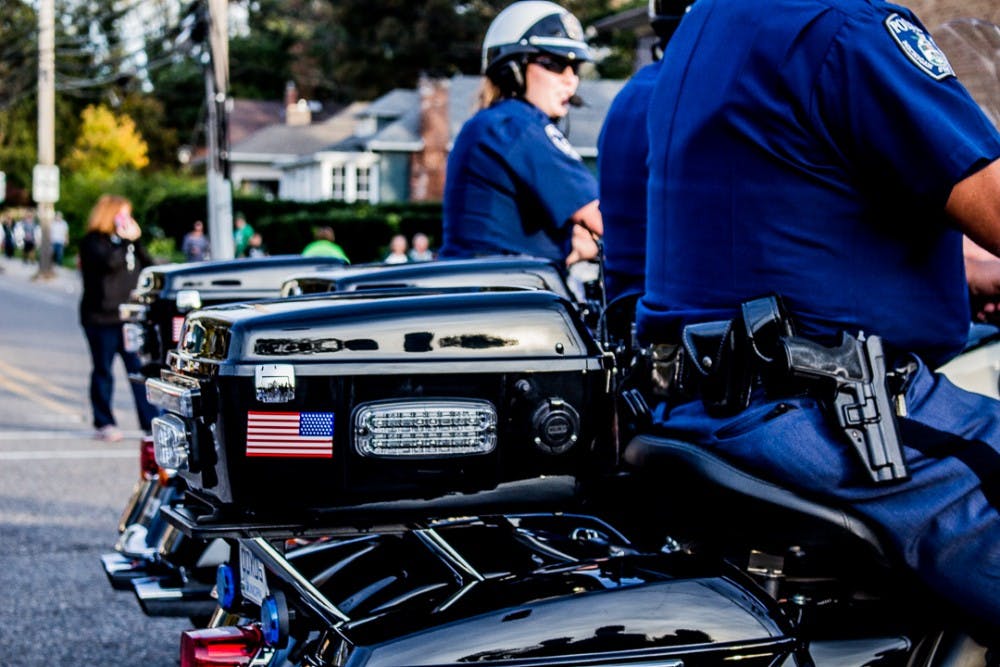As police misconduct has dominated headlines for the better part of this decade, there has been a growing sense of mistrust among police departments and the communities they serve.
The East Lansing Police Department is trying to buck that trend by using community outreach — and viral tweets — to connect with residents. Sgt. James Campbell, the department's Community Outreach Coordinator, said there are numerous initiatives he has overseen in an attempt to humanize police officers to skeptical citizens.
One of the biggest changes in ELPD's community outreach is its emphasis on social media to reach out to the student population, Campbell said. The department's Twitter account regularly utilizes GIFs and pop culture references, relaying messages in a lighthearted manner.
"Our officers have been enjoying the social media because it gives them another avenue to express themselves and make themselves more personable, so people aren't afraid and people aren't upset with them all the time," Campbell said. "We wanted to use social media to break down those barriers."
Campbell said when departments don't go beyond enforcing the law to create relationships with citizens, it can lead to mistrust. He said he has made an effort to avoid this by overseeing community discussions and the department's anti-bias council.
The department has open communications with Black Lives Matter, an activist organization known for its non-violent protests against police brutality, according to Campbell.
"If you have a police department that is not involved in the community, you have a divide," Campbell said. "In that divide, people ... get a feeling that their police department isn't serving in their best interests. And when people don't believe that police officers are serving their best interests, then when something happens, it's automatically us against them."
Campbell also serves as the LGBTQ Liaison for the department. He said this position is important because, as a black man, he can identify with the effect that bias-related incidents can have on LGBTQ individuals.
"With the times that we're in, I don't think there are any agencies out there that are going to allow any bias-related crimes to go by without being properly addressed," Campbell said.
The department is also making an effort to be transparent about their actions, whether positive or negative. For the last two years, the East Lansing Police Department has released a report on complaints made against officers, both internally and by citizens.
On Jan. 9, East Lansing Info reported 16 complaints about an officer's conduct were made in 2017 out of 43,000 calls for service, with eight internal complaints and eight citizen complaints.
Lt. Chad Connelly said having a number in the teens was a point of pride for the department, given the volume of service calls per year.
"When you think about the number of contacts that we can have in just a sheer week, it's a pretty good thing that we're getting this few complaints, and that we're providing that level of service," Connelly said.
In an effort to prevent misconduct and reduce citizen complaints, in October 2017 the city implemented a "Fair and Impartial Policing" policy intended to prevent bias-related incidents, according to Campbell.
The impartial policing policy includes a section on immigration enforcement, which bars officers from detaining or arresting individuals based solely on their immigration status.
The policy also prevents members of the public from facing unwarranted questioning about whether or not they are legal residents. In order to obtain such information from individuals, officers must identify that they are asking those questions as a part of an active criminal investigation.
Lt. Steve Gonzalez, who has served approximately 20 years with the ELPD, was influential in developing the policy alongside the Lansing American Civil Liberties Union, or ACLU. He said the section on immigration was included not because immigration enforcement has been a problem for the city, but rather to clearly state the department's stance on the issue.
"What it does is it reaffirms our dedication to serving our community in a fair and impartial manner," Gonzalez said.
Gonzalez said the impartial policing policy is posted on the department's website along all other policies, in an attempt to be transparent about ELPD's guiding principles. He said it is important for citizens to understand not only how officers operate, but why they choose those methods as well.
Support student media!
Please consider donating to The State News and help fund the future of journalism.
As a result of that transparency, Gonzalez said during his time on the force, he has seen drastic improvement in the department's relationship with the community, a trend he hopes the impartial policing policy and other community relations initiatives will continue.
"We work very hard to maintain and grow a strong relationship with all areas within our community," Gonzalez said.
Discussion
Share and discuss “East Lansing police taking steps to improve community relations” on social media.







